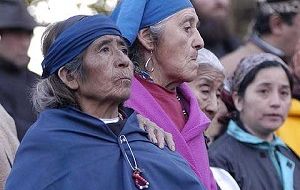MercoPress. South Atlantic News Agency
The 34 hunger striker Mapuches in Chile has become world news
 The indigenous Mapuches have a long list of demands
The indigenous Mapuches have a long list of demands Chile’s government said this week it will be impossible to meet demands by 34 Mapuche hunger strikers that all three branches of Chile’s government meet together to resolve the on-going hunger strike.
“We have been open to dialogue,” said government spokesperson Ena Von Baer. “And so if the hunger strike continues, it is because they are asking for something that would put them above the rule of law, and no one in Chile can be put above the rule of law”.
The strike, now approaching its 80th day, has put much of the country on edge and brought national and international coverage of Chile’s “Mapuche problem” as never before. The recently elected conservative government led by President Sebastián Piñera is especially concerned that a tragic denouement to the strike would put an unsightly blemish on what has been - so far – a very successful first year of governance.
“For all the branches of the government to sit at the table is antithetical to democracy, and to the rule of law,” said government official Cristian Larroulet. “The representatives of the Mapuche community shut the door to weeks of work and discussions that would allow the Mapuche to end the hunger strike.”
In the course of the discussions, the government has offered to withdraw all terrorism charges that have been levelled against the more than 100 Mapuche activists now jailed, and to instead rely on the regular criminal laws for prosecuting the activists.
The dialogue table has been mediated by Catholic Bishop Ricardo Ezzati, of Concepción, but his role in future dialogue is unclear. He has said this week that he may not mediate future discussions.
Supreme Court President Milton Juica has confirmed that he will not sit at the dialogue table.
“I would like to explain this to the Mapuche community, so that they understand that we desire to resolve this quickly, but lamentably it cannot be done by a judge sitting at the table to discuss something that is already being processed” Juica said, referring to the reforms to the law that are currently being considered in Congress.
Supreme Court President Juica also admitted that there are problems with the anti-terrorism law, one of the main reasons the Mapuche prisoners began their protest.
“The anti-terrorism law in its current form is an obstacle to reaching an agreement, and so we should look for a way to modify and moderate the law, to give it more relevancy in the democracy in which we live,” Juica said. “The law does not have a very good past because it was created and frequently used in an undemocratic government.”
The anti-terrorism laws were first created during the dictatorship of Gen. Augusto Pinochet, but later employed by both the Ricardo Lagos and Michelle Bachelet governments in an effort to intimidate Mapuche activists and take them out of circulation.
The hunger strikers have all been arrested as terrorists for crimes ranging from armed assault to arson, carried out in a campaign to reclaim ancestral lands that were sold by the government without the Mapuche’s consent.
In addition to protesting the anti-terrorism laws, the hunger strike is also against the militarization of the Araucanía Region (IX), where most Mapuche live, and the police’s use of excessive force against the Mapuche people.
The hunger strike continues to attract growing international attention. A document signed by Noam Chomsky, the North American activist/linguist, and several other artists and politicians from around the world calls attention to “the dangerous indifference of the Chilean authorities to the rights of the people who represent the first inhabitants of the country.”
The document continues, “It is urgent that the international public opinion knows and exerts pressure to save the lives of the Mapuche, who are only exercising their right to seek a fair trial.”
By Kara Frantzich – Santiago Times




Top Comments
Disclaimer & comment rulesCommenting for this story is now closed.
If you have a Facebook account, become a fan and comment on our Facebook Page!